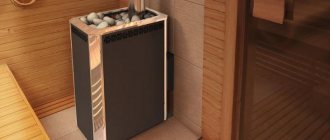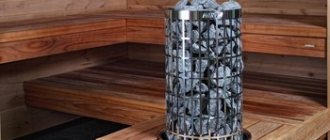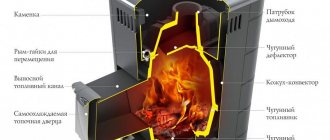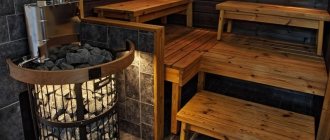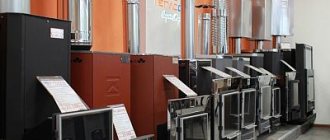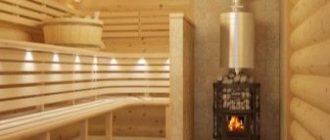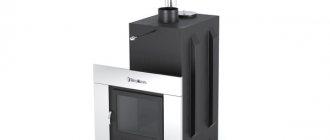A combination stove is quite practical equipment for bathhouses. Thanks to its advanced configuration, it combines the functions of heating a room and heating water for bathing.
A distinctive feature of such a device is the ability to work on both solid fuel (wood) and gas (natural and liquefied).
This device is quite versatile due to the presence of elements for different types of heating. There are separate devices for burning gas and solid combustible substances.
In order to install such a stove in a bathhouse, even at the design stage it is necessary to take into account the large size of the equipment. In addition, there are different models of universal stoves that differ in functionality. Some are designed with an emphasis on heating large volumes of liquid, while others are characterized by ease of use. These features also need to be taken into account during construction.
Kinds
Depending on the location of the water reservoir in the design, there are three types of gas-wood stoves:
- Units with built-in heating tank. This equipment is easy to use and low maintenance. The container is made of stainless steel and is installed above the fuel chamber on the side of the heater. This structure of the furnace allows you to heat the stones and water in the tank at the same time. The main advantage of the equipment is that there is no need to drain the liquid. As for the disadvantages, these include the fact that the stove is designed for a small volume of water. In one session you can heat up to 20 liters, and this amount is quite enough for several people.
- Stoves with a tank mounted on a chimney. This design is more practical, as it is aimed at saving heat generated from smoldering firewood. Due to the fact that the tank is installed directly on the chimney, combustion products do not enter the environment, but pass through the water, giving off their heat and thereby warming it up. This system is capable of heating large volumes of liquid for several hours, so you can safely fill a storage tank of 50-75 liters.
- Ovens with a separate remote container. The water in the tank is heated using a coil mounted in the combustion chamber. The storage device can be placed in any corner of the bathhouse, even in the dressing room. Another important point is that it contributes to additional heating of the room. In addition, you need to be very careful when operating the tank, because there is a high probability of getting burned if you accidentally touch it.
As a safety measure, do not forget to periodically release heated water to avoid large accumulations of steam in the room.
It is advisable to use combined sauna stoves only if there is a need to heat water.
To choose the most suitable and efficient unit for a bath, you need to consider the following factors:
- Tank capacity. A large capacity of 50 liters is a good solution for a large family or for installation in an industrial bath. If the room is designed for several people and there is no need for so much water, it is better to choose a built-in storage tank with a capacity of 20-25 liters. It saves space indoors and requires virtually no maintenance.
- Technical conditions. For the main or additional heating of a bath room or dressing room, a stove with a remote tank is well suited. The coil in this case serves as a regular radiator. However, this device has its drawbacks. The first is the mandatory use of the water circuit, and the second is the constant repair, and sometimes the complete replacement of the coil, which tends to clog frequently.
- Terms of Use. The gas-wood stove has a device that allows it to be used for both a Russian bath and a Finnish sauna. The main difference between these rooms is the temperature and humidity of the heated space.
Peculiarities
has been manufacturing heating equipment since 2003 and has accumulated vast experience in this industry. The very name of the company, translated from Greek, means “carrying heat,” and this speaks for itself: it produces reliable units that effectively warm any room, even in severe frosts.
The products include a wide variety of sauna stoves, both gas and wood-burning.
Sibirskaya manufactures sauna stoves that can quickly heat the interior of a steam room at low temperatures. Their special feature is combustion chambers made of heat-resistant steel used in aircraft construction, which are capable of maintaining heat inside for a long time. And the double combustion system used allows you to heat the bath to the desired temperature in the shortest possible time. For example, a boiler reaches 100 degrees in 60 - 70 minutes of operation in frosty winter and literally in half an hour in summer.
For more than 15 years of work, he has received international certificates in the field of quality and safety standards, as well as many other awards. Heating systems for baths are in great demand and popularity in our country and abroad.
Advantages
Among the main advantages of stoves with a combined heating type are the following:
- The fastest possible heating of a bath room of any size.
- Easy installation and maintenance.
- Economical fuel consumption, whether wood or gas.
- Compliance with all fire safety standards.
- Compact dimensions, allowing installation even in a small room.
Conclusions and useful video on the topic
Pros and cons of gas sauna stoves and operating features:
Sauna stoves with the possibility of switching to the use of blue fuel are convenient and practical to use. They allow you to save on heating and reduce the period of preparation of the bathhouse for your favorite procedures. But you need to choose such a unit, armed with complete and reliable information about the functionality and characteristics.
Would you like to tell us about what kind of sauna stove you purchased to equip your own sauna? Share whether your choice has the ability to switch to gas. Please leave comments in the block form below, ask questions and post photos on the topic of the article.
Requirements for installation of furnace equipment
To connect the heating device to the chimney, you need to choose the right pipes: one product must slide into the other in the direction of combustion by at least 0.5 diameters. It is recommended to use pipes made of stainless or roofing steel.
It is important to avoid laying rolled metal products through residential premises: this can be dangerous!
Places where the pipe passes through wooden floors must be thermally insulated. Over time, the wood dries out so much that one day it may burst into flames due to high temperatures. Therefore, the attic must also always be kept clean and tidy.
The section of the pipe above the ceiling must be insulated to avoid condensation. If this is not done, the temperature difference on the inner and outer walls of the pipe will cause water droplets to appear inside the product. In the future, this will cause destruction of the masonry and a decrease in the level of traction. In addition, the condensed liquid dissolves the flue gas, thereby creating acids that corrode the pipe.
Try to use only dry firewood. Burning plastic or glued objects in the firebox can also lead to condensation.
This problem is especially obvious in winter during severe frosts. It is also possible that ice plugs may freeze in the upper part of the chimney. However, insulating the entire pipe will help avoid these troubles.
During installation of the equipment, it is necessary to provide an outlet for cleaning the channel in the smoke system, since over time it can become clogged. To do this, an easily removable section can be made at the junction of the main part of the chimney with the pipe.
An opening 35-45 cm wide is made in the wall between the dressing room and the steam room at a height of 47-55 cm from the base of the stove for the exit of the burner and the front part of the heating device.
The thickness of this wall should not exceed 30 cm, so as not to complicate the maintenance of the equipment during its operation.
It is prohibited to attach the unit to walls or floors and install additional brick structures nearby that may interfere with heat exchange.
There are also some requirements for the waiting room. Among them the following are noted:
- it must be 2.2 m high and have a hood, as well as a window with ventilation;
- it is important that the door opens outward;
- it is desirable that the chimney is located at a level of 5 m above the burner;
- the joints between the duct and the furnace must be sealed, and all pipes in the room must be carefully insulated.
Choosing a wood- or gas-fired sauna stove
The choice of furnace is influenced by several factors, operational and operational characteristics, as well as additional functionality. Manufacturers offer heating equipment for baths, characterized by the following characteristics:
- Type of heater - stoves are made with an open and closed heater:
- An open-type heater warms up the room faster and allows you to get a large volume of wet steam.
- Bi-fuel metal gas-wood stoves for saunas with a closed heater are easier to operate and cool down more slowly after firing. To produce steam, a system of tubes is used through which water falls on heated stones.
The principle of operation is that hybrid stoves, capable of switching from gas to wood without conversion, are easy to use, but are expensive. Models with the possibility of conversion will cost approximately 40% less. Transferring from one type of fuel to another will take about half an hour, provided that the heat exchanger has cooled down.
Availability of a water heating tank - gas-fired sauna stoves with a heat exchanger for heating water and heating, are manufactured in two versions:
- Most often, stoves are equipped with a remote water heater tank installed on the chimney pipe. Capacity volume up to 80l, rarely 120l.
Gas and wood-burning sauna stoves with a built-in water tank are less common, mainly in modern models of the latest generation.
The operation and efficiency of a gas-wood stove largely depends on the three above factors
The first thing you need to pay attention to when selecting is the type of heater, operating principle, presence and type of water heating tank. According to the selected parameters, the stove is selected according to the manufacturer
Recommended sauna stoves for gas and wood
In the production of dual-fuel stoves, domestic manufacturers have practically no competitors. Consumers were able to evaluate the quality, reliability and convenience of the design of gas-burning stoves.
Judging by the reviews, the following models were able to gain popularity:
- Ermak Uralochka.
Heat, Luxgas, Supergas and Extragas series.
Termofor Urengoy and Termofor Taimyr.
Zharstal, Sinara and Meteorite series.
Convection.
All of these stoves have proven themselves well in Russian operating conditions, have a long service life and high heat output.
First heating of a combination stove
To get rid of the smell of paints and industrial oils that coat the device, it must be heated in a special way before full operation begins.
To do this, you need to open the windows and doors in the room wide, load the device for burning flammable substances to the maximum and heat the stove for one hour. The heater must remain empty.
After making sure that all structural elements are working properly and waiting for the stove to cool down, you can begin full operation.
In the future, odors present at the beginning of the combustion process will not appear.
Varieties
According to the design, method of connecting or disconnecting any type of fuel, there are three types of gas-wood stoves:
- Convertible. The design is a classic gas stove made of cast iron, which comes complete with an additional chamber for solid fuel and a mounted heater. If desired, you can easily turn off the gas supply, install a firebox with a heater and use firewood.
- Paired. A massive device that consists of two modules. One of them runs on gas, the other on wood. The parts are combined by one heater. Another design feature is the presence of two separate chimneys.
- Monoblock. This is a one-piece design with only one combustion chamber for different types of fuel. To use gas or firewood, you need to turn special valves. They divide the firebox into two parts and the design is universal.
Depending on the location of the water tank, there are 3 types of structures:
- Built-in tank. The water container is made of stainless steel. When wood burns, liquid and stones are simultaneously heated. Due to the fact that the tank is built-in, it is limited in size.
- The tank is fixed to the chimney. The gases that pass up the pipe transfer their heat to the liquid. The maximum volume of the mounted tank is 75 liters.
- A container of water is installed next to the equipment. Heating of the liquid occurs due to heat transfer through the coil. In this case, the tank can be placed in any convenient place.
A separate division relates to the location of the firebox. It can be built-in or remote.
The water tank is fixed next to the stove
Mechanisms responsible for safety
A gas-wood stove has the main element responsible for safety - the burner. It contains an igniter, which, when ignited, begins the operation of the device. The operation of this element is regulated exclusively manually.
Important processes such as combustion, maintaining the gas level and maintaining the set temperature occur automatically.
To maintain the safety of combination furnaces, all mechanisms of the device must be perfectly adjusted.
In the event of an emergency, the automatic system will stop supplying gas to the fuel chamber. These include:
- little or no cravings;
- extinguishing of the igniter or burner;
- overheating of equipment or exceeding the permissible temperature in the steam room.
Rating of the TOP 10 best gas stoves for baths for 2022
| TOP 4 best gas stoves for baths by price/quality for 2022 | ||
| 1 | Vesuvius Skif Forging 18 (DT-3) | Find out the price |
| 2 | TMF Urengoy | Find out the price |
| 3 | Vesuvius Lava 18 (DT-3) | Find out the price |
| 4 | TMF Taimyr 2022 Carbon | Find out the price |
| TOP 3 best gas-wood stoves for baths | ||
| 1 | Ermak Uralochka-20 | Find out the price |
| 2 | EasySteam Sochi K | Find out the price |
| 3 | Koster-Potok 18 | Find out the price |
| TOP 3 best budget gas stoves for baths | ||
| 1 | Teplodar Rus-18 | Find out the price |
| 2 | Ermak Uralochka 30 | Find out the price |
| 3 | Kutkin Premium G-2.0 | Find out the price |
Nuances of installation work on installing a chimney
The smoke from the stove in the bathhouse brings discomfort to a person. The combustion product is harmful to health and damages the furniture and decoration of the steam room. To avoid all this, you should properly arrange the chimney system.
The chimney is installed taking into account regulatory requirements and construction features. Since the bathhouse is considered an object with a high temperature regime, the material used for the chimney is as heat-resistant as possible. In order for the chimney to be efficient, you should not make numerous turns and bends.
The ratio of height and diameter plays a major role in the traction force that is constantly present in the pipe. The diameter size is affected by the power of the furnace equipment and the size of the outlet pipe; the height depends on the roof, but must be at least five meters.
They have their own characteristics. For example, parts of the structure located horizontally should not exceed one meter in length. Heated air always moves upward, and wide areas in the horizontal can significantly reduce draft and allow soot to quickly accumulate.
If you plan to install a brick chimney, then the masonry must be designed in such a way as to achieve maximum smoothness of the internal walls of the pipe and tightness of the seam areas.
Another important feature is insulation, the quality of which determines the efficiency of the entire work process and safety for the user.
When installing a chimney for a gas stove, an additional list of requirements is observed:
- the diameter must completely coincide with the parameters specified in the accompanying instructions for the furnace;
- the cross-section of the stove chimney and the gas outlet channel must be the same;
- the chimney must exceed the roof ridge by at least fifty centimeters;
- It is best to install cylindrical chimneys made of stainless steel material, which have a built-in cleaning system;
- there should be no more than three turning sections on the path of products obtained during the combustion process;
- the distance from the boiler to the beginning of the chimney should not exceed twenty-five centimeters.
What documents are needed to connect gas to a sauna?
It is adjacent directly to the house, equipped with an entrance from the residential part of the building, therefore, unlike a detached one, it does not require access to the street in winter, nor does it require laying a heating main.
The location of the gas boiler room depends on the living space and the homeowner’s own preferences. From a safety perspective, attached and freestanding are the best choices.
The requirements are absolutely identical for any type of gas boiler house:
- You cannot install more than two boilers or other heating devices, or store flammable materials in the room.
- It is prohibited to install floors with any other material other than concrete or tiles.
- It is unacceptable to decorate walls with flammable materials. You can use brick, concrete, tile or metal.
- It is recommended to place the boiler in the center of the room.
- When all the paperwork has been completed, installation and construction work begins.
- The final stage is connecting gas to the house. Gorgaz employees should come to you and check that all conditions are met.
This will take 2-3 weeks. Afterwards, a technical supervision receipt is issued, after which, along with all the documents, it is submitted again to Gorgaz.
Hiring a contractor Project documentation is drawn up based on the list of connected devices, as well as the actual connection of this equipment, carried out in full compliance with all safety rules and the location of chimneys. When the necessary data is provided, a specific person is determined who is responsible for connecting the gas pipeline to the house. After drawing up the project, installation and construction of the pipeline is carried out.
Taking this into account, when choosing a private contractor, they give preference to those companies that not only draw up the project, but also carry out the connection. In addition, comprehensive services involve quite significant savings.
We suggest you familiarize yourself with How to attach panels to clamps
Supplying gas to a private home The final stage of gasification is a gas test. This procedure takes from fourteen to twenty-one days. Private specialists cannot provide this service. This is illegal.
Necessary calculations Involve calculation of thermal load. This parameter consists of several factors:
- total area of housing construction;
- lack or presence of high-quality insulation;
- number of window and door openings;
- ceiling heights.
It is much easier to carry out the necessary calculations if you contact a specialist.
Attention
How to obtain technical specifications? Documents are either prepared independently or with the help of specialists. The cost of such services depends on the complexity of the project and varies.
The more complex the work, the higher the price.
- Having analyzed prices in Russia, we can conclude that gas supply to a private home on average costs from 70,000 to 400,000 rubles.
- Benefits At the same time, in our country there are many citizens who are supported by the state, and they are provided with a large number of benefits, but they do not apply to gas supply. There are concessions only for gas payments. The federal government left the right of choice to local authorities to provide benefits to various categories of citizens.
403 forbidden
The service company pays a connection fee and monthly payments. The exact amount is determined by the owner of the gas pipeline.
The main condition for gasification involves the inclusion of the site on which the house is located in the general gasification scheme and an uninterrupted supply of energy. If this condition is met, then you can begin collecting the required documentation.
This process takes approximately 20-30 days (working days). In addition, it is necessary to take into account the distance from the house to the gas main
Here the maximum permissible length and gas consumption are taken into account
The first parameter is 210 meters, and the second is 5 cubic meters per hour.
- In the Moscow region, the price range is large; it depends on the distance from Moscow and ranges from 400,000 to 700,000 rubles.
- In the Leningrad region it is easy to see that the situation is a little simpler, and it is quite possible to keep within 300,000 rubles.
- In the Nizhny Novgorod region, the cost of this service ranges from 150,000 to 200,000 rubles.
- In the European part of Russia, the price drops sharply to 70,000 - 120,000 rubles.
- In the Asian part of the Russian Federation, the situation is worse, due to the remoteness from industrial centers and gas pipelines, equipment has to be transported from Asia-Pacific countries and the West (for example, in the Novosibirsk region prices increase to 200,000 rubles).
- The situation is much worse in the Far East, since this is due to the low availability of main gas pipelines and, at the same time, the low price of equipment.
